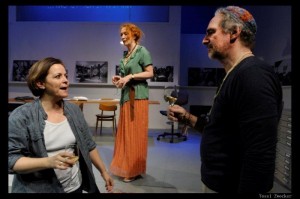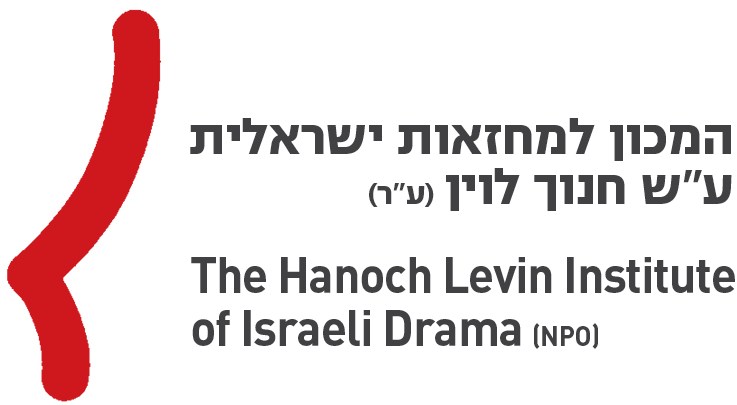בין שני העולמות / שרה פון שוורצה
Zwischen den Welten
|
דרמה
הטקסט ב: |
על ההצגה "בין שני עולמות": אברהם ובת זוגו סבינה חוזרים לאחר בילוי ללופט בו הם מתגוררים במינכן ומגלים בדירה פורצת.
מסתבר שרות, בתו של אברהם, היא הפורצת. רות בורחת מאירוע שקרה בארץ, במהלך עבודתה כעוזרת צלם-עיתונות בשטחים, אירוע שעליו היא אינה מוכנה לדבר.
מלאת כעסים היא מעמתת את בני הזוג עם זהותם כגרמנים. דרך העימות הפרטי של שרה עם אביה – שבחר להתגייר עם אשתו לשעבר ולעלות לארץ – עולות שאלות נוקבות על מוסר, זהות, אשמה, יחסי הורים וילדים, זוגיות ועוד.
המחזה הינו דו לשוני- גרמנית עברית – כך שממש מול עינינו, באמצעות השפה, נאבקות הדמויות בהבדלי המנטליות והזהות.
שלוש דמויות יוצאות דופן בערב דחוס והזוי. שלושה אנשים המנסים לענות על השאלות: מהי זהות? האם היא מוקנית לנו מלידה, או שזהות היא מה שאנחנו בוחרים להיות? איך מתמודדים עם אשמה, עם השואה ואיך אפשר לזכות בשלווה המיוחלת לה שואפים כולנו?
|
הדמויות |
נשים: 2
גברים: 1
סה"כ: 3
רות- בת 35-40, בתו של אברהם, מדברת עברית כשפת אם וגרמנית עם שגיאות. אברהם – בן כ-70 פלוס, אביה של רות, מדבר גרמנית כשפת אם ועברית במבטא כבד ושגיאות. סבינה – בת 43-50, בת זוגו של אברהם, דוברת גרמנית כשפת אם ואינה מבינה עברית כלל.
|
תרגומים |
אנגלית, גרמנית מתרגמת מעברית לגרמנית – אסתר פון שוורצה מתרגמת מעברית לאנגלית – מרגלית רודג'רס |
הפקות |
בכורה2012 / 09 / 27 Altes Schauspielhaus Stuttgart בימוי: מנפרד לנגנר | Manfred Langner דף ההפקה
|
ביקורות |
מאת: צבי גורן בין שני עולמות – אשמים בגורלם משחקה של שרה פון שוורצה בתפקיד רות הוא מלאכת מחשבת של חיבור בין אישיותה הפרטית לאישיותה כשחקנית, כשהיא כועסת, כשהיא לועגת, כשהיא פוחדת מכל צלצול טלפון מהארץ, וכשהיא מתרככת ומתפייסת. היא כתבה לעצמה תפקיד מצוין ואיכות המשחק שלה מעמיד אותו כאחד משיאי 20 שנותיה על הבמה" "בין שני עולמות", כמחזה וכהצגה, מביא התבוננות אמיצה וחשובה במרקם הכפול של אשמה ותיקון המאפיינים את הקשר היהודי-גרמני המעוצב עתה על ידי הדור השלישי. [From Haaretz, 18/12/2012] Complex, Revealing, Beautiful Michael Handelsaltz An important part of In Between is biographical. The playwright, Sara von Schwarze, was born German and brought to Israel as a child by her German parents, both of whom converted to Judaism. Her father subsequently returned to Germany where he lives as a Jew with his non-Jewish wife. This is the same human-family composition of the characters in the play. Part of the play is fictional: the protagonist, who is significantly named Ruth (the first Jewish convert), flees from Israel to her father and his wife and unburdens the tangle of her life onto them – as an Israeli photographer working in the Occupied Territories, she feels doubly guilty as an Israeli, a German, a Jew, and a woman, and seeks relief and salvation from her father, with whom she is angry and in need. This is a bilingual German-Hebrew production, a collaboration between the Cameri Theatre and the Schauspielbühnen in Stuttgart, and if ever there was a justified German-Israeli coproduction (and there are many), then this is the one. Although the fictional part adds complexity to what is already complex in any case, the play benefits from the fact that Von Schwarze plays the lead role in German and Hebrew. Above all this is her story, it is she who was condemned to the complexity of her fate, and it is she who has managed to contain and express it in a well-crafted play (perhaps too well-crafted, especially at its conclusion). As a member of the audience, I was fascinated by the personal story unfolding before me, with its personal and national complexity, at the center of which is a sense of guilt that is more powerful than the person, and comes with their origins and history. The three characters in the play are complex, multidimensional, and each of them is treated fairly, allowing all of them to be attacked as well as to present their case. In some respects, Cornelia Heyse, a Schauspielbühnen company actress, is also the audience’s representative, for the layers of the plot are revealed to her just as they are revealed to the audience. As the “German” representative, she brings – with honesty and sincerity – the pragmatic attitude whereby life in the present takes precedence over the traumas of the past, and is also its hope. Eli Gorenstein as the father, supposedly the villain, manages to imbue the character with humanity and gain the audience’s sympathy. And this is no easy feat in face of the forcefulness of Von Schwarze as herself: exposed, vulnerable, beautiful, bold, unpredictable, and inspiring love. This is her evening – with director Manfred Langner, and designer Paul Lerchbaumer – because with courage, honesty, and anguish she has turned the painful wound of her life, and to a great extent ours too, into an independent work of art. Thank you, Sara. [From Yedioth Ahronoth, 18/12/2012] Critical Acclaim in Germany “Sara von Schwarze gives a powerful performance, endowing the character with vulnerability and fear… The plot is surprising… The play touches upon incisive questions, including current political issues.” (Jüdische Allgemeine) “The tension builds up between the characters by means of the clever dialogues, which are skillfully presented and performed by the three actors, as more and more details are revealed.” (Kultur) “As an Israeli playwright, Sara is unrestrained, fearless, and points an accusing finger at difficult subjects like the Holocaust and politics.” (Die Wanderbühne) ביקורות וכתבות נוספות ישלחו לפי דרישה. More critics and articles will be send on demand. |
ציטוטים |
|


